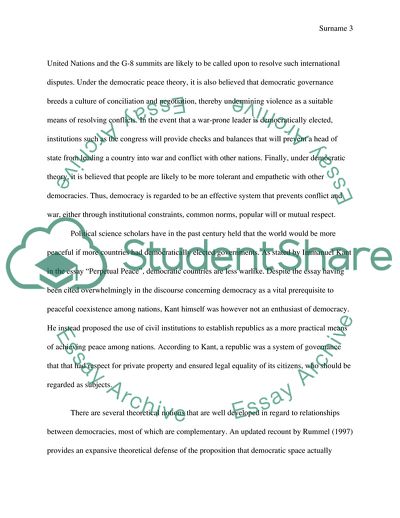Cite this document
(Empirical Evidence in Democratic Ideals: Peace at Domestic and International Levels Essay Example | Topics and Well Written Essays - 1500 words, n.d.)
Empirical Evidence in Democratic Ideals: Peace at Domestic and International Levels Essay Example | Topics and Well Written Essays - 1500 words. https://studentshare.org/history/1815327-does-democracy-promote-peace
Empirical Evidence in Democratic Ideals: Peace at Domestic and International Levels Essay Example | Topics and Well Written Essays - 1500 words. https://studentshare.org/history/1815327-does-democracy-promote-peace
(Empirical Evidence in Democratic Ideals: Peace at Domestic and International Levels Essay Example | Topics and Well Written Essays - 1500 Words)
Empirical Evidence in Democratic Ideals: Peace at Domestic and International Levels Essay Example | Topics and Well Written Essays - 1500 Words. https://studentshare.org/history/1815327-does-democracy-promote-peace.
Empirical Evidence in Democratic Ideals: Peace at Domestic and International Levels Essay Example | Topics and Well Written Essays - 1500 Words. https://studentshare.org/history/1815327-does-democracy-promote-peace.
“Empirical Evidence in Democratic Ideals: Peace at Domestic and International Levels Essay Example | Topics and Well Written Essays - 1500 Words”. https://studentshare.org/history/1815327-does-democracy-promote-peace.


